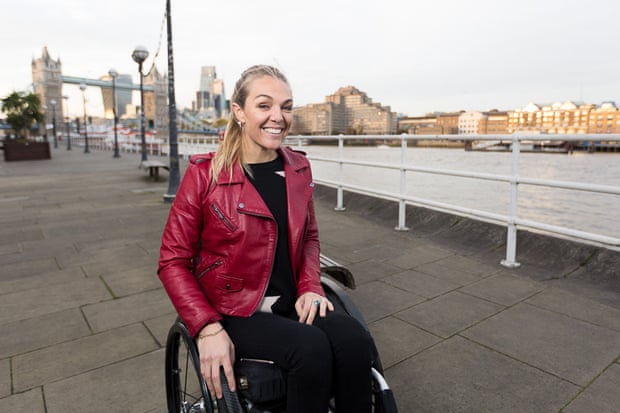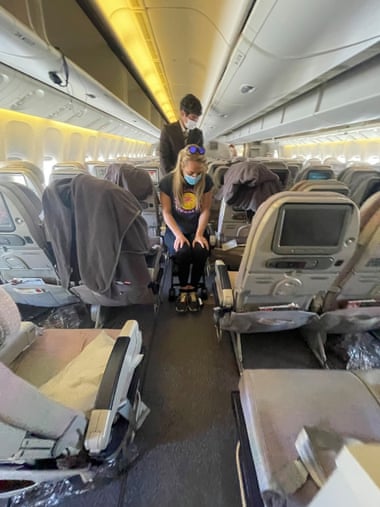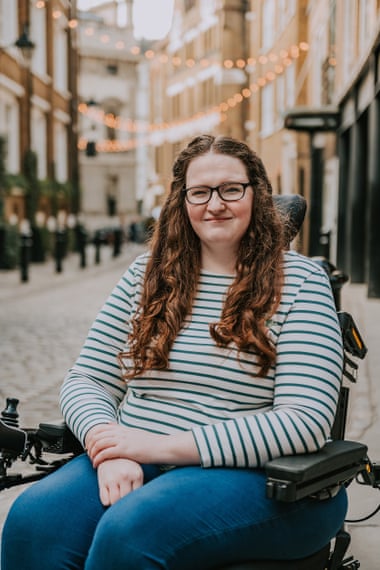Sophie Morgan is fed up. The TV presenter, best known for her appearances on Loose Women and presenting the Paralympics, travels all the time for work – she films all over the world – and she knows what she is doing. But, because she is a wheelchair user, “every single flight is a risk”, she says.
For disabled people such as Morgan and me, air travel is perhaps uniquely stressful. There are so many things that can go wrong, alongside a shocking lack of dignity. Will they allow our wheelchair through security, or will we be forced on to airport chairs that we can’t use independently? Will the wheelchair be left behind at the gate, leaving us stranded? Will it be broken en route, ruining a work trip or a holiday? Will assistance come before boarding closes? Will we be hurt as we are manhandled on to the plane?
None of these worries, however, come close to the big one: are we going to be left behind? Once all the passengers are off, this question rumbles around our heads as we crane to see whether assistance is coming. If it doesn’t come, we are stranded. Despite there having been years of campaigning for wheelchairs to be stored in the cabin, most airlines insist on sending them down to the hold. This means there is often a delay in bringing the chair back up to the cabin door at the end of the flight. And, of course, planes are still designed with aisles too narrow for standard wheelchairs, meaning anyone who can’t walk off the plane must wait for staff to help them with a specially made aisle chair (which is not designed to be used independently) .
This problem finally came to public attention in June when a disabled passenger died at Gatwick airport after falling from an escalator. He had chosen not to wait for assistance. While Gatwick and Wilson James, the company responsible for assistance at the airport, said there wasn’t a shortage of staff at the time, all disabled people know that adequate staffing is no guarantee we won’t be left behind. If you are in desperate need of the loo, because you haven’t been able to go on the plane (it is 2022, but airlines still don’t provide disabled toilets), sometimes the only option is to take matters into your own hands .

It happens all the time, says Morgan. In April, she was stranded when she returned from a filming trip in Helsinki. She hadn’t been warned in advance that the plane didn’t carry an aisle chair, so she spent the entire flight stressed about being unable to go to the toilet. She was desperate to get off the plane to be reunited with her wheelchair and her autonomy, but no assistant arrived.
She asked the cabin crew how long the wait would be. “They just shrugged. No one offered any reassurance,” she says. “Meanwhile, I’m not going to get to the loo in time.” Her traveling companion could see her wheelchair on the bridge, but she had no way to reach it. Forty minutes after landing, an assistant appeared – but they couldn’t help Morgan use the aisle chair. They hadn’t been trained and were obliged to wait for another member of staff. There was no apology.
Eventually, Morgan’s companion did what many are forced to do: he grabbed the aisle chair and got her off the plane himself. “Definitely against insurance policy,” Morgan says, half laughing, half groaning. Even once she was in her own wheelchair, no one helped – or apologised.
This is just one of Morgan’s many stories of being denied the assistance she needs and to which she is entitled. I ask how she maintains the confidence to travel so often. “I travel a lot, but never without fear,” she says. “It sounds awful, but I just expect the worst, then I plan what I’ll do if the worst happens – if I wet myself, if I’m stranded, if I’m dropped, if my chair is damaged. I’m always kind of in a state of distress.”
The distress is heightened because, in order to avoid needing the loo too soon, she restricts her food and drink intake the day before she flies. (On long-haul flights, there is usually an aisle chair, but if you need a carer or can’t stand at all, you just have to wait.) It is a degrading choice to make, but “in the end, traveling is so worth it. I think of it like an extreme sport – I know there’s every chance it’s going to end in tears, but if I want to do it, I’ve got to risk it.”

Most disabled people know the gnawing stress of air travel, but everyday journeys can be just as anxiety-inducing. Many will be familiar with the almost mundane experience of being left stranded on a train. Shona Louise, a theater photographer, often travels around the UK for work, particularly in and out of London, from her home in St Albans. “Ninety per cent of the time, especially on routes I know, everything is fine,” she says, emphasizing that she doesn’t want to put other disabled people off traveling alone. “The problem is that when things do go wrong, they go really badly wrong.”
As a powerchair user, she is reliant on someone turning up with a ramp. The most common problem is when the member of staff who puts Louise on the train forgets to call ahead to the station where she is getting off. “They can’t help me if they don’t know I’m coming,” she says. Sometimes the destination station staff are aware that she needs help, but are waiting on the wrong platform, or at the wrong time. “That stings the most,” she says, because she is being let down by the system, not just human error. “There should be a way for disabled people to get themselves help, rather than relying on people to remember.”
After too many experiences of being forgotten and missing her stop – and therefore heading towards a station where no one is aware she needs help – Louise has learned to block the train doors with her chair. This, she acknowledges, is dangerous, but sometimes it is the only way to get the onboard guard’s attention. It is her only choice – missing her stop “can change or ruin your whole day”.
Louise often travels late at night, after shows have finished, adding to the stakes. If she misses her stop and has to get out at another station, she won’t have any way of getting home. “It’s scary and disorientating,” she says. In these situations, her only options are to block the doors or press the emergency button. This can annoy staff and fellow passengers, because it causes delays, but Louise insists disabled people have every right to keep themselves safe when the system doesn’t. “I’m a confident traveler and I won’t be put off because I have to get to work, but when I’m stuck and can’t get home, it is horrendous. It’s really emotional taxing.”
Transport for All, a pressure group working to make public transport more accessible, emphasizes that it is not just people with mobility impairments who are left stranded. Blind and visually impaired passengers may also need help to navigate busy airports and stations, as may some neurodivergent people. “It is vital that disabled people can trust that staff will be on hand, but unfortunately this is not happening,” says Katie Pennick, the group’s campaigns manager. Official data shows that only 75% of booked assistance is received (no data exists for assistance arranged at stations). “The impact of this cannot be overstated … it can put people off and be a real barrier to traveling.” She emphasizes that this doesn’t only affect people traveling for leisure, but can make commuting to work or appointments, as Louise and Morgan do, extremely difficult.

Both women say that bad attitudes compound the structural issues. Being forced to wait for assistance, as if we are a glorified piece of luggage, is dehumanising in itself – and then we are treated as an inconvenience. Staff act as if we are the ones making their lives difficult.
Morgan happened to be traveling from Gatwick the day after the disabled man died on the escalator, when details of the incident were still unknown. As she was taken through the airport, she asked the man assisting her whether there was any more information about what had happened. “All he did was talk about the impact it had had on Wilson James staff,” she says. “I was so incense. I thought: ‘How can you be looking at me, a wheelchair user, and saying that was the hardest thing?’ It just tells you everything you need to know about the company.”
After the incident, Wilson James said in a statement: “The agent was at the gate within one minute of the aircraft parking on its stand, and the incident itself only happened 10 minutes after the aircraft landed. The agent who handled the passenger is very experienced, has been working in this service for a number of years and has a background working with people with complex disabilities and needs in the care sector.”
This is not the only example of airport staff blaming disabled people that Morgan has seen this year. As she was waiting to board another flight, an announcement was made, explaining that boarding had been delayed because a disabled passenger from the previous flight was still on the plane. “It didn’t mention that assistance hadn’t turned up. And then they had to get off in front of all these annoyed people,” Morgan says. It can’t be right that going on holiday as a disabled person so often involves public humiliation.
Mel Kennedy uses a walking frame, which she says means train staff don’t always take her need for the ramp seriously. She, too, has been blamed for service failure. On the way home from a trip to meet a friend, the guard hadn’t come past her during the journey and so didn’t know she was onboard. No one had radioed to tell him, either. At her stop, she pressed the call button, but no one came. Luckily, other passengers pressed their buttons, too, and eventually the guard arrived – just in time.
As the guard was putting the ramp down, he made a remark to another passenger: “Well, to be honest, she should have told the station staff.” But, of course, she had told the staff where she set off, and there was no one to tell at her destination – it is an unmanned station. Kennedy worries that things will only get worse as more stations lose their staff, a concern shared by Transport for All. Kennedy says that the stress of some of her recent journeys has made her pull out of trips with friends unless they are going somewhere familiar.
Pennick says that a solution comes in three parts: “Money, resources, and prioritization. There needs to be a culture change in government and in the transport sector – accessibility must be seen as a core, fundamental and non-negotiable part of a functioning public transport network, in the same way as safety and sustainability.” She adds: “Sadly, too often, accessibility is seen as a nice-to-have, or a luxury that can be scrapped when money gets tight.”
Ultimately, the disabled people I spoke to want transport systems to be designed so that we don’t even need assistance – for all trains to have level boarding and for mobility aids to be welcomed on flights. But this is going to take time. In the meanwhile, Pennick says, “decision-makers must listen to disabled people – especially when changes to services are being considered. There is a slogan in the disability rights movement: ‘Nothing about us without us,’ and at Transport for All we firmly believe that it’s only when the lived experience of disabled people is applied to the design, planning, running and evaluation of services that they will truly offer access for all.”
Change is desperately needed. Morgan, Louise, Kennedy and thousands like them are tired of being left behind.